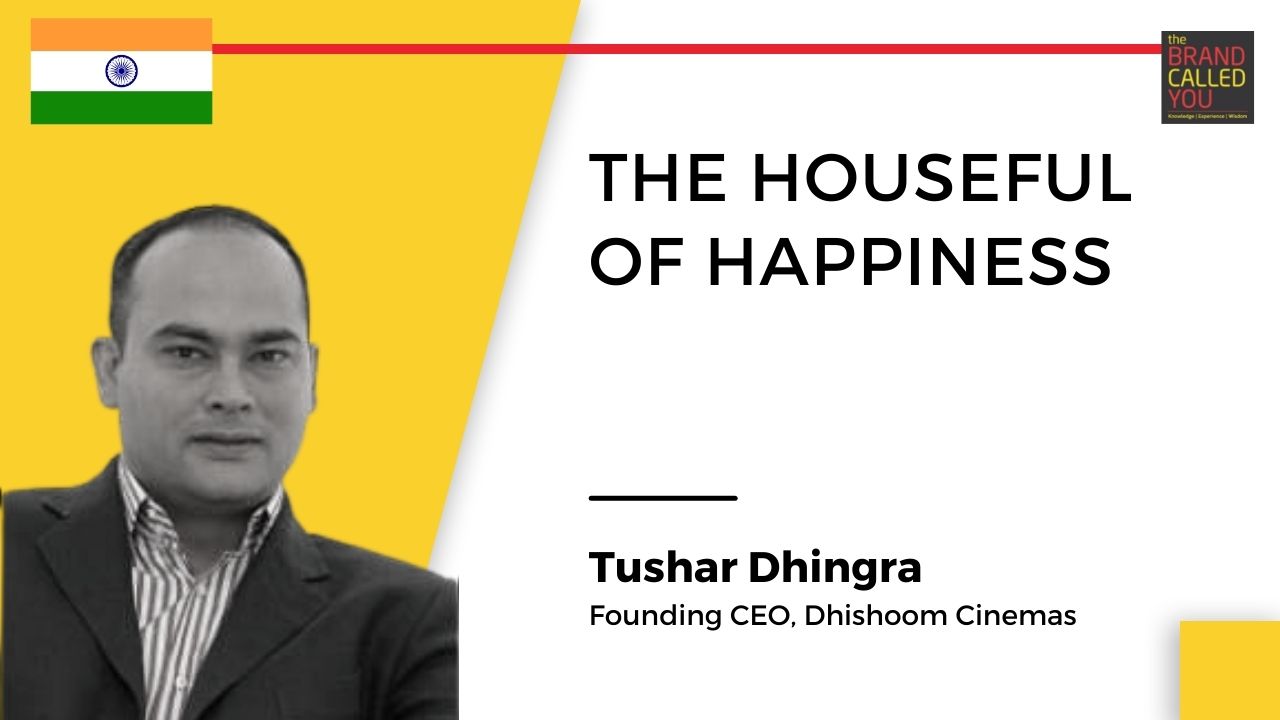Tushar Dhingra, Founding CEO, Dhishoom Cinemas
Founding CEO at Dhishoom Cinemas. Cinema experience at compelling value brought to you via laser technology projection, Immersive sound and vibrant ambience.
Podcast
Overview
Whenever we are planning a day out with our family, a three-hour movie is always included in the schedule, or when we plan to catch up with old friends, we often plan to go to a movie together. With the help of our guest for this episode of The Brand Called You, Mr. Tushar Dhingra, let’s understand what makes the experience of the cinema halls so comfortable for us.
Tushar Dhingra is the Founding CEO of Dishoom Cinemas. He is a tenured retail and entertainment leader. He is also the ex-CEO of Smash Entertainment. He has served as the Chief Marketing Officer at PVR and the Chief Operating Officer at Big Cinemas.
‘Dishoom Cinemas’
Tushar believes that movie-going is the ultimate outgoing activity that any Indian can consume. He calls Dishoom the houseful of happiness. For him, it is like a minivacation in air condition theatres. Tushar adds that the legacy players are only focused on the top end of the market and address 150 cities, whereas they target all districts of the country and work to provide a world-class experience at a great value.
Tushar tells us that there are about 8000 screens in India, which is very little in comparison to China, which has about 40000 screens. However, the population density and socio-culture of going to a movie is quite similar to China. Tushar believes that there is a big gap to fill. He adds that since the natural resources are dispersed and not available, malls and multiplexes have become the urban parks in our country.
Challenges & learnings in the process of scaling up
Discussing the challenges of scaling up, Tushar spoke about how handling high CAPEX can be challenging. However, they have worked on it and substantially found a way to be 30 to 40 percent lower in terms of their CAPEX. They also differentiated in terms of their approach to going to market. They later realized it doesn’t have to be working at 30 percent occupancy that works.
Tushar also tells us that about 90 percent of Indian screens are still working on projectors that are powered by lamps that have to go through an analog journey of luminance and go down. Dishoom Cinemas have come in now and they have the benefit of technology and all their cinemas are with laser projection even in smaller towns.
What are some of the economic challenges? How does the film economy work with distributors?
Tushar tells us that cinemas work on a revenue-sharing basis with content providers. If 100 people come in, they pay a revenue share of 100 people who come in on the basis of the admission price we would have charged. Tushar says that the good part about their business is that they don’t have to try very hard to create sales. One just needs to create a great facility, be big on hospitality & consistent in efforts.
On being asked about economic affairs if a movie does not do well, Tushar says that every week they have four or five films, that too only Hindi. As a film exhibitor, they have to understand the geographical catchment and decide if it will be a 10 screen or 2 screen location. Keeping in mind the content and the catchment trying to service and then they have to go out in the market and build it.
How have pandemic and proliferation of OTTS impacted theatres like Dishoom?
Tushar believes that the OTT provides a certain level of value, entertainment, and convenience. However, he believes that one should always play with their strength. In Tushar’s case, it would be providing a day of digital detox by inviting people to his cinema hall. He says that one cannot undervalue the collective energy that comes in a cinema space. He believes that a joke lands a lot better in an auditorium than on a small screen. However, the affluent viewers of the OTTs have watched a lot of content and the expectations on content have gone up so the zeitgeist of today will need to deliver better content. He believes that they need to create an experience where magic stays.
Tushar’s views on the belief that cinema hall owners make more money from food than exhibit the film.
Tushar believes that it is a Chicken & egg situation. He tells us that combined economics work and supports each other. However, he also feels that the cinema food is priced at a premium so the experience also needs to be heightened.
Overall, Tushar believes that storytelling is a very unique skill and he would always want to create happy moments for his viewers.
Profile
Gritty, Agile, Mindful.
Intellectually Curious.
Invincible Optimist.


